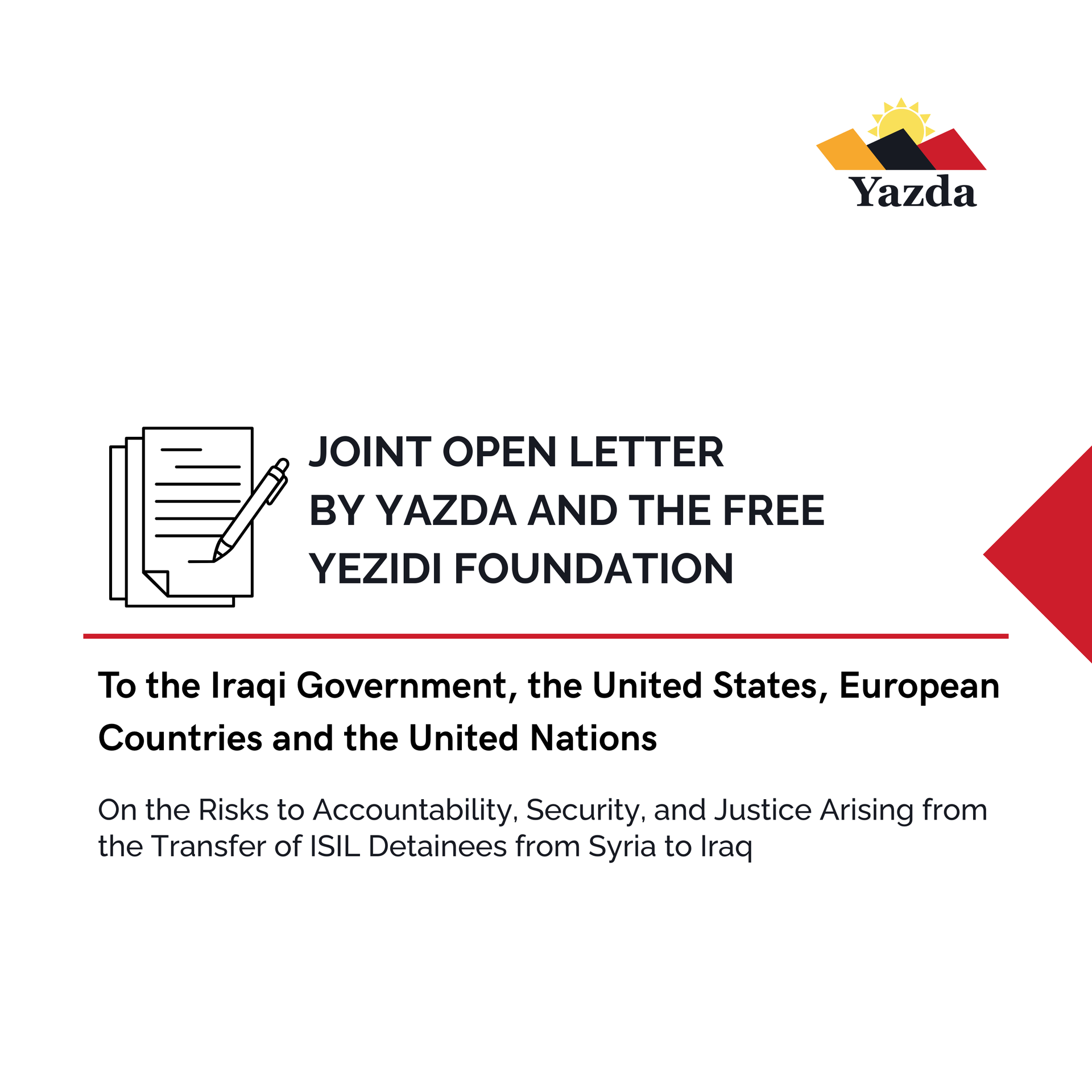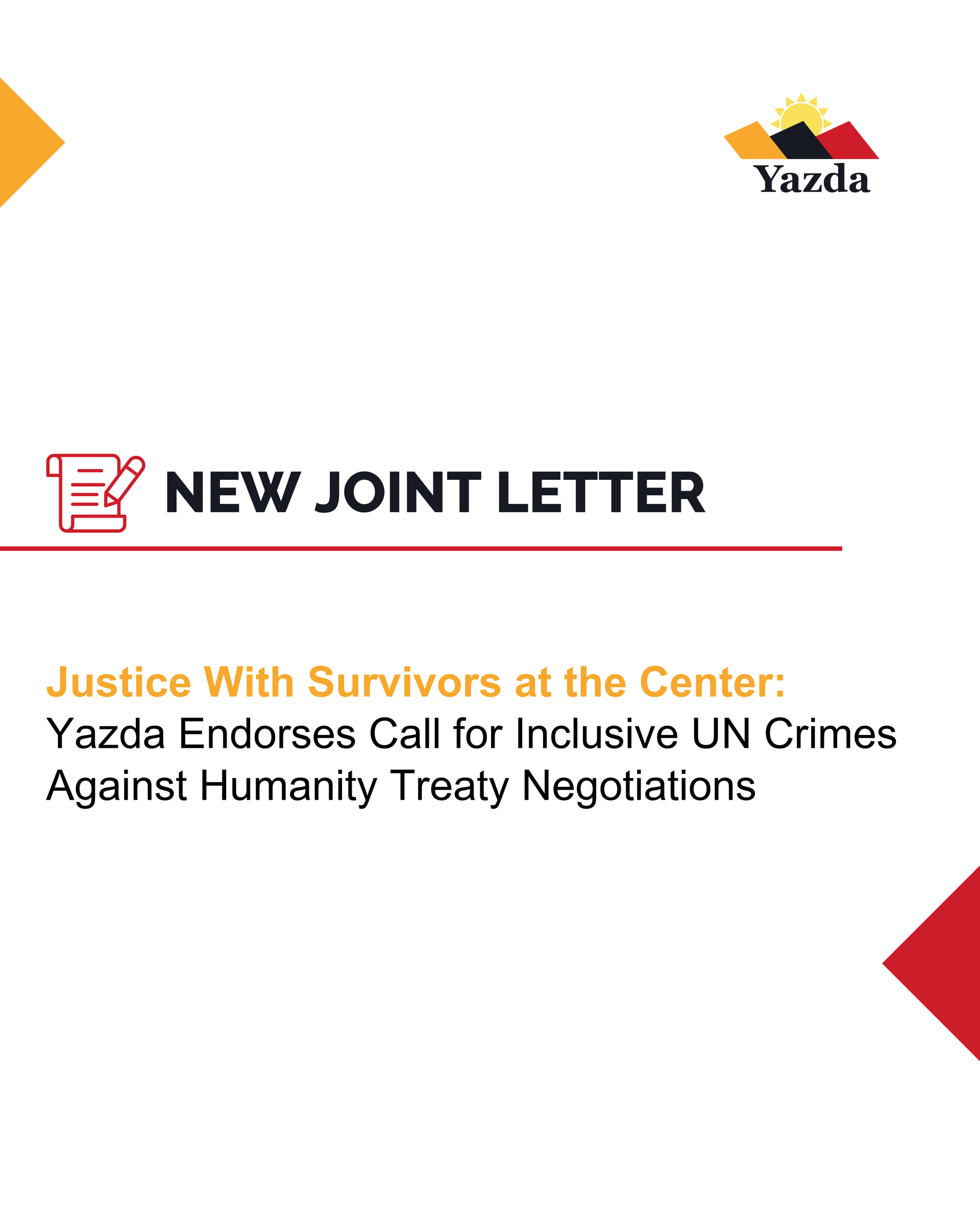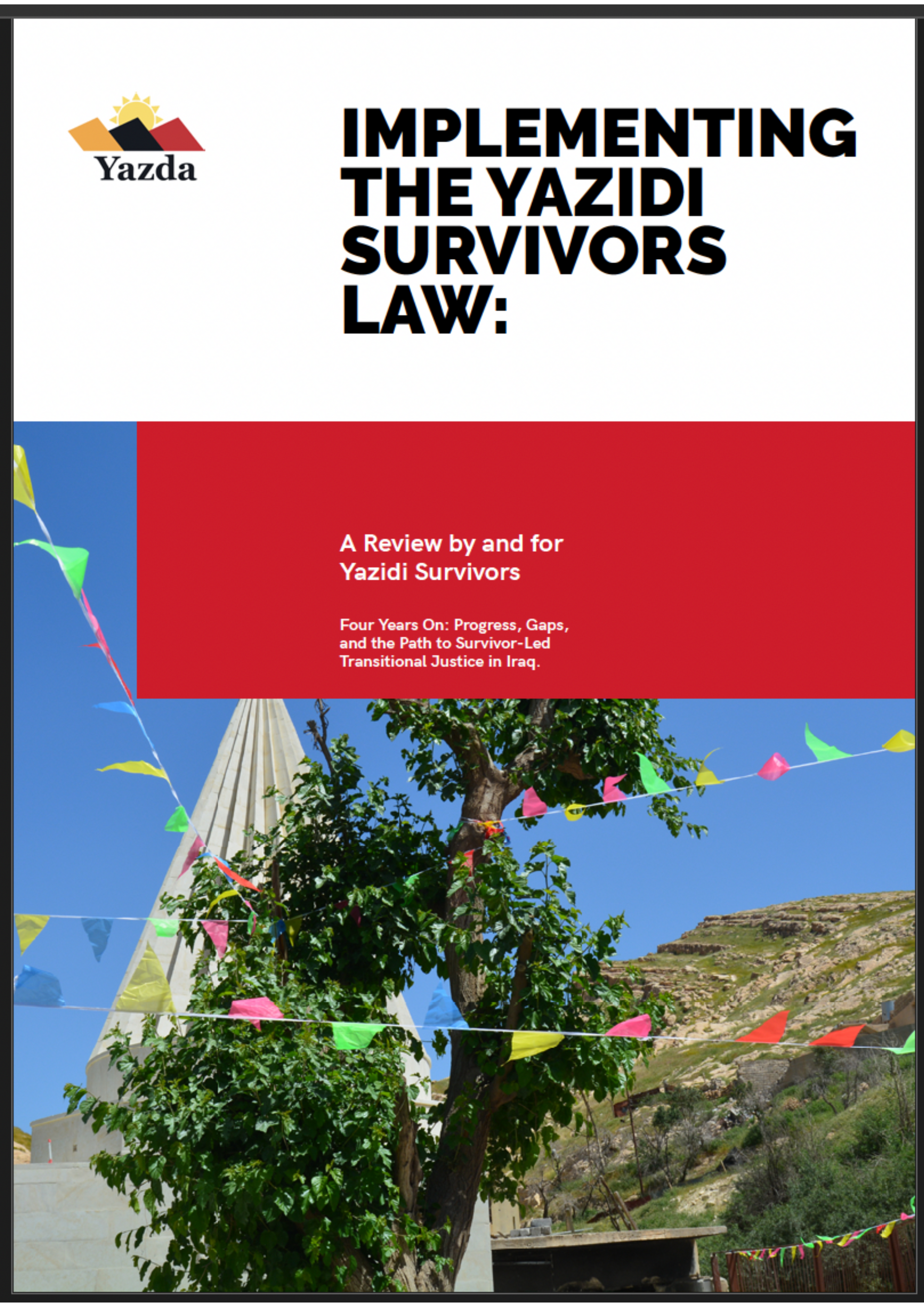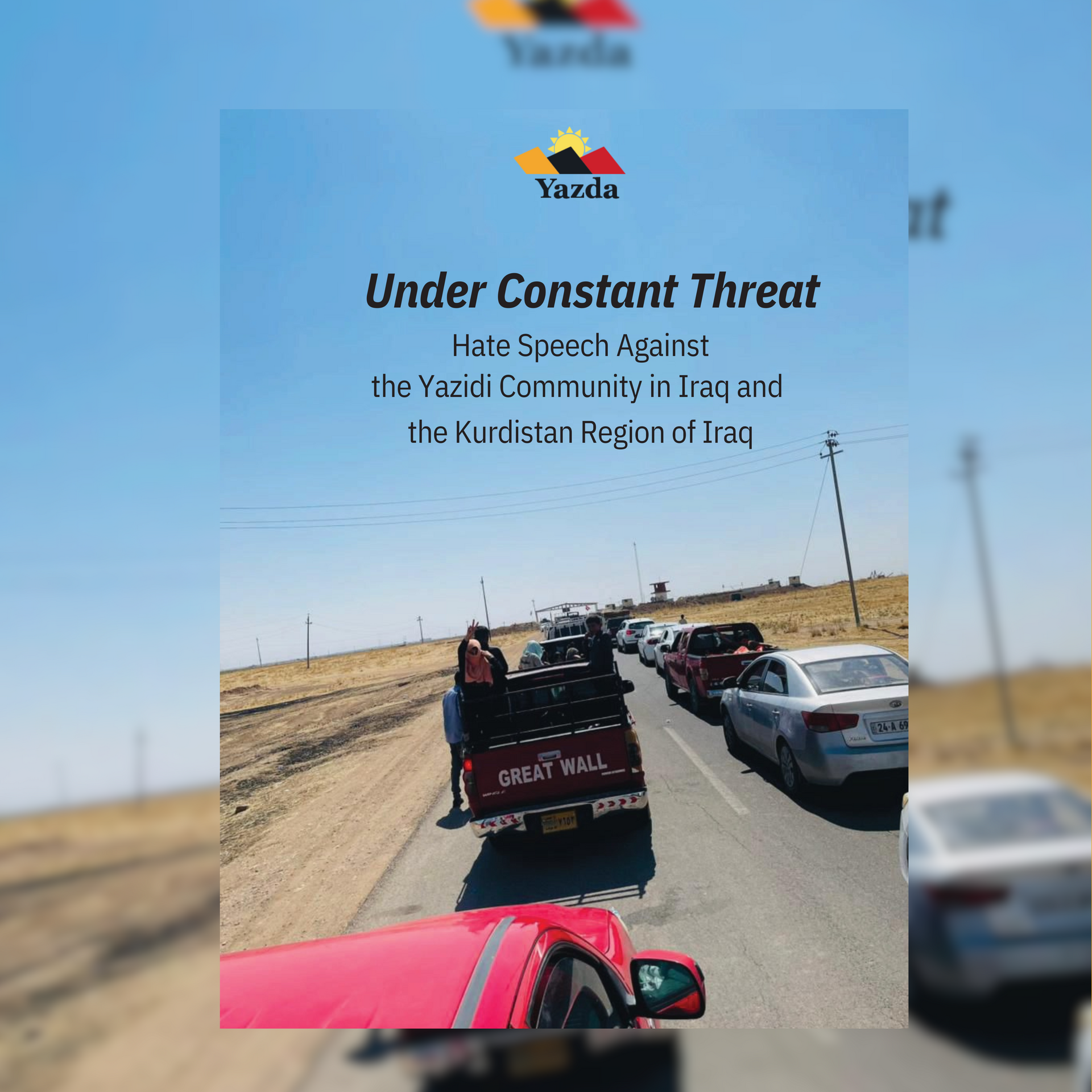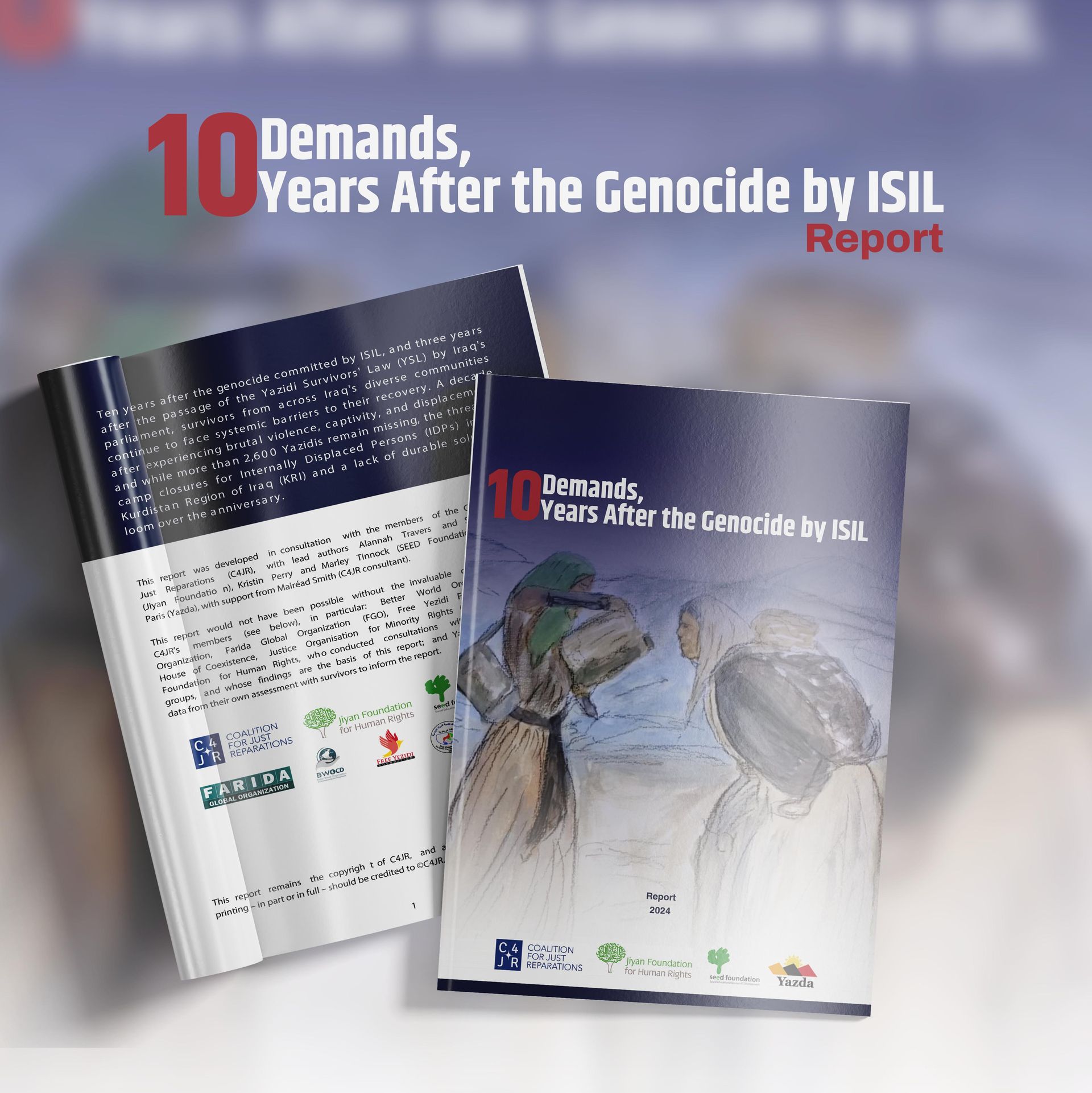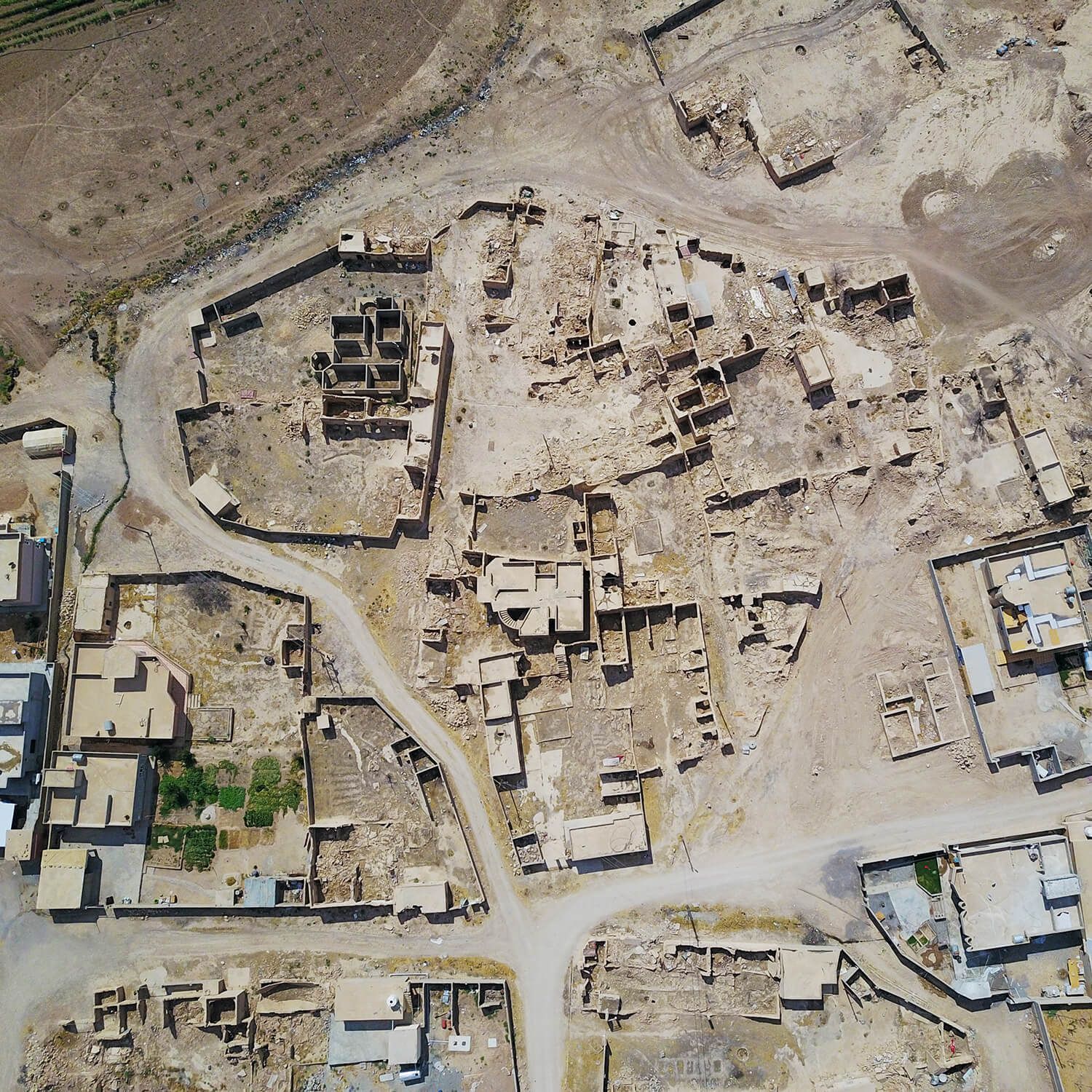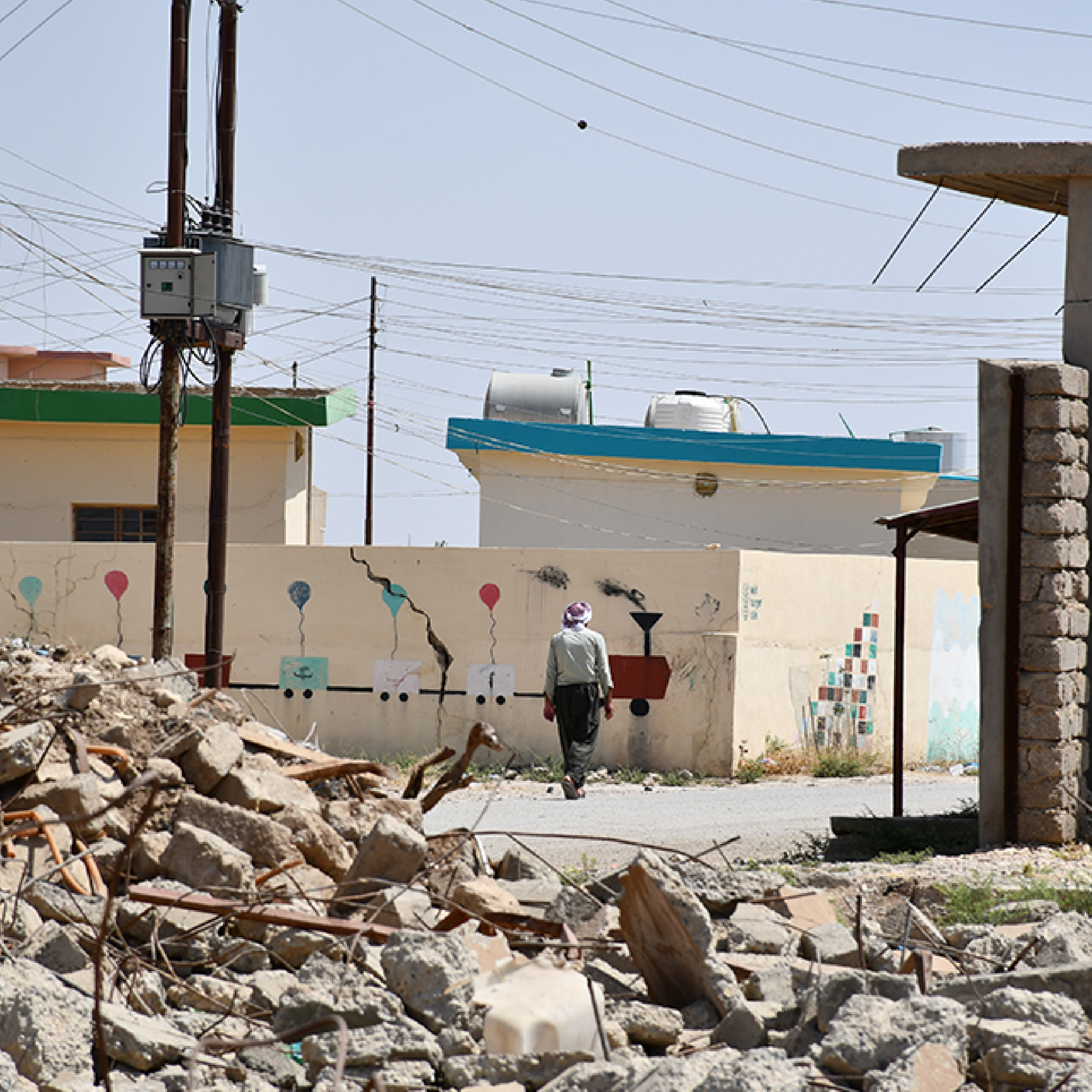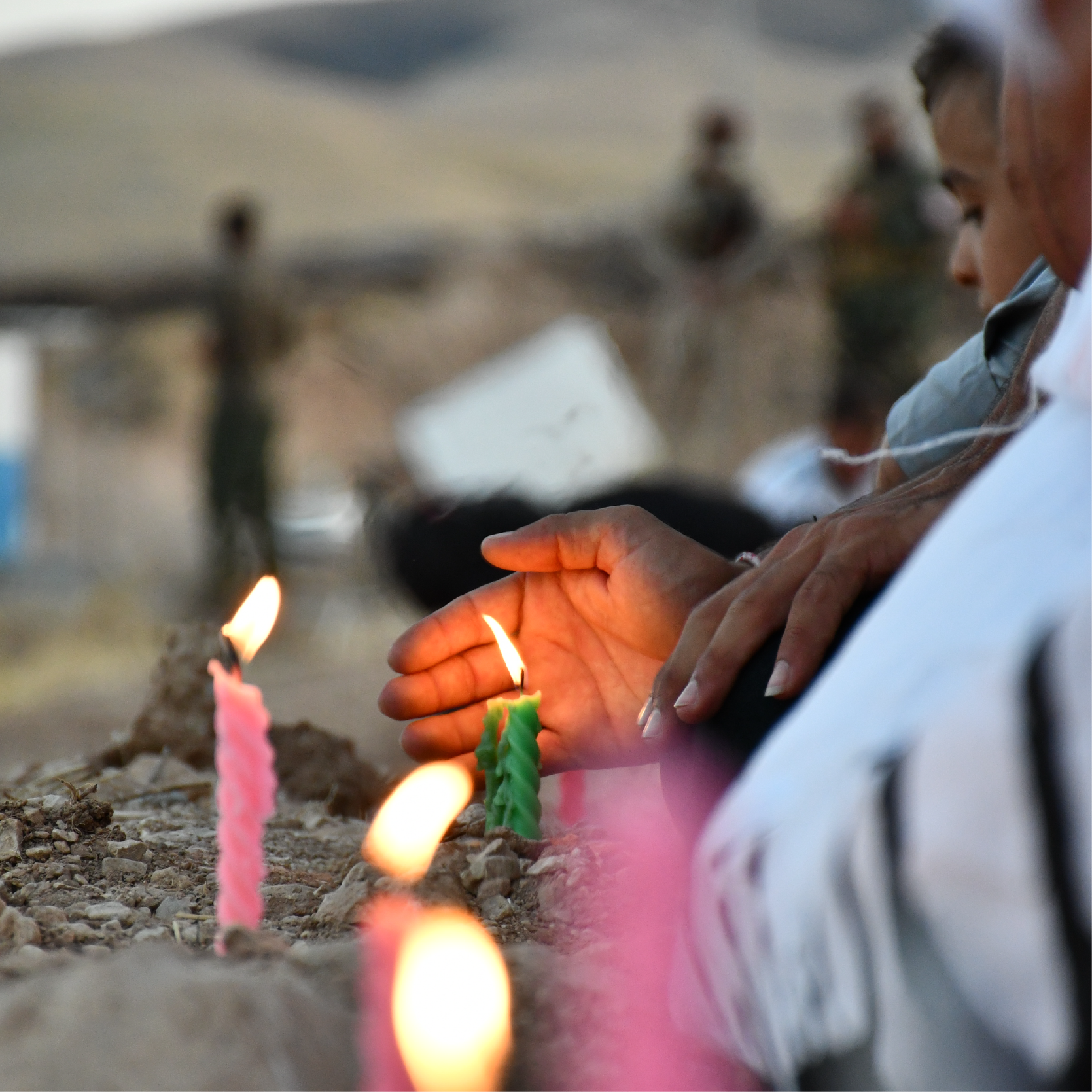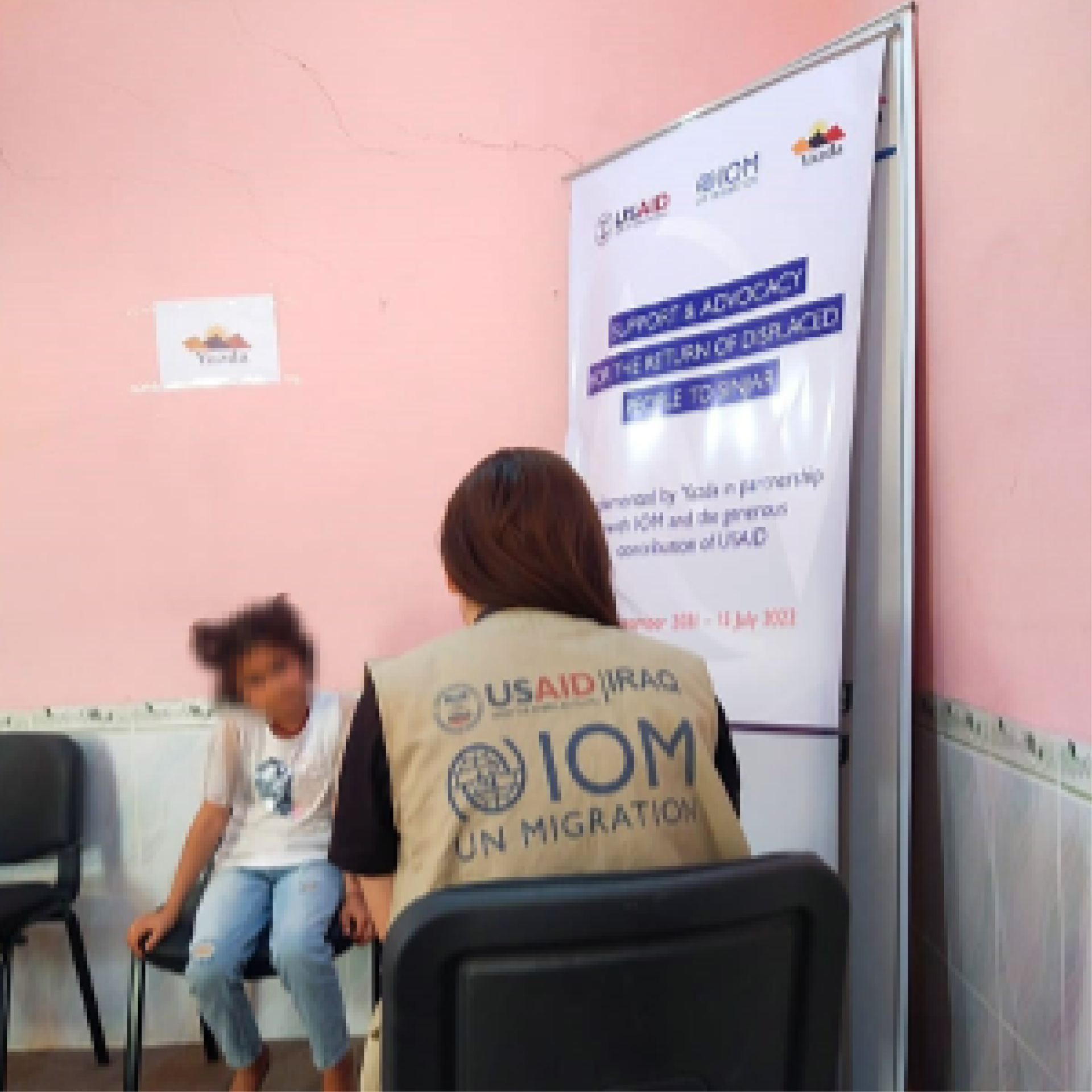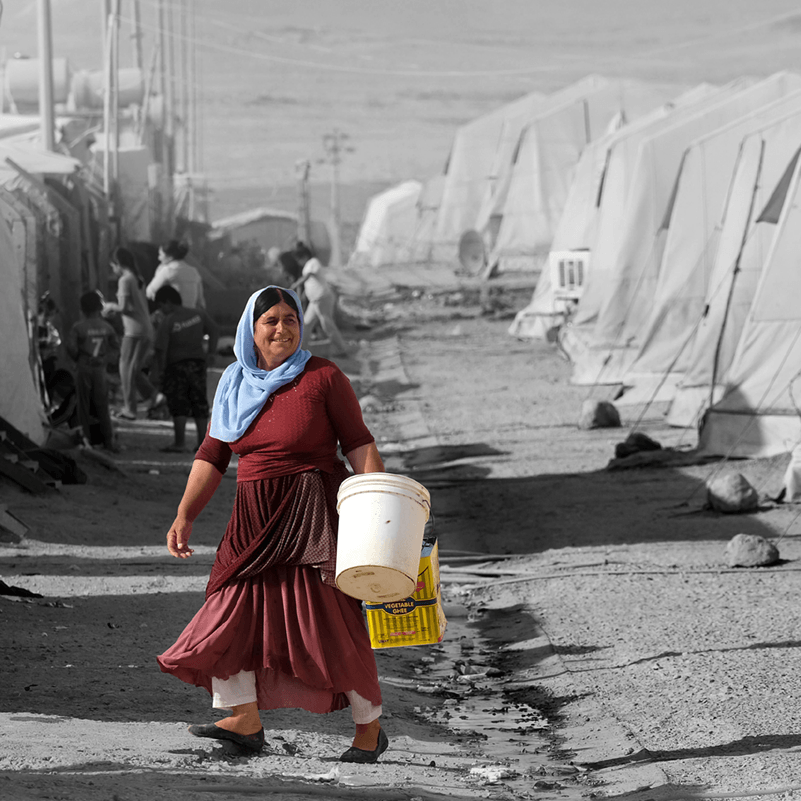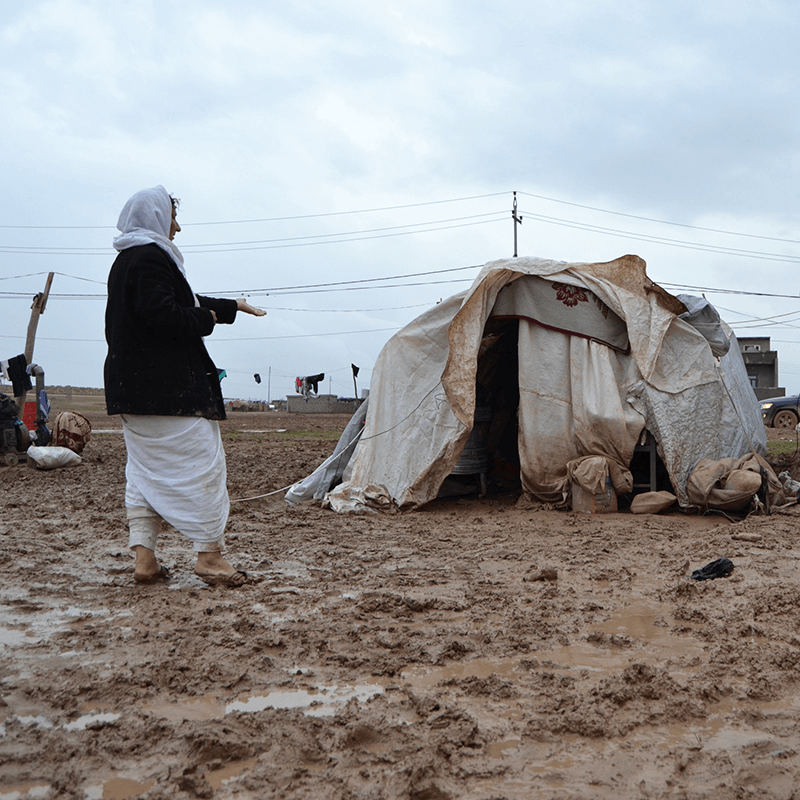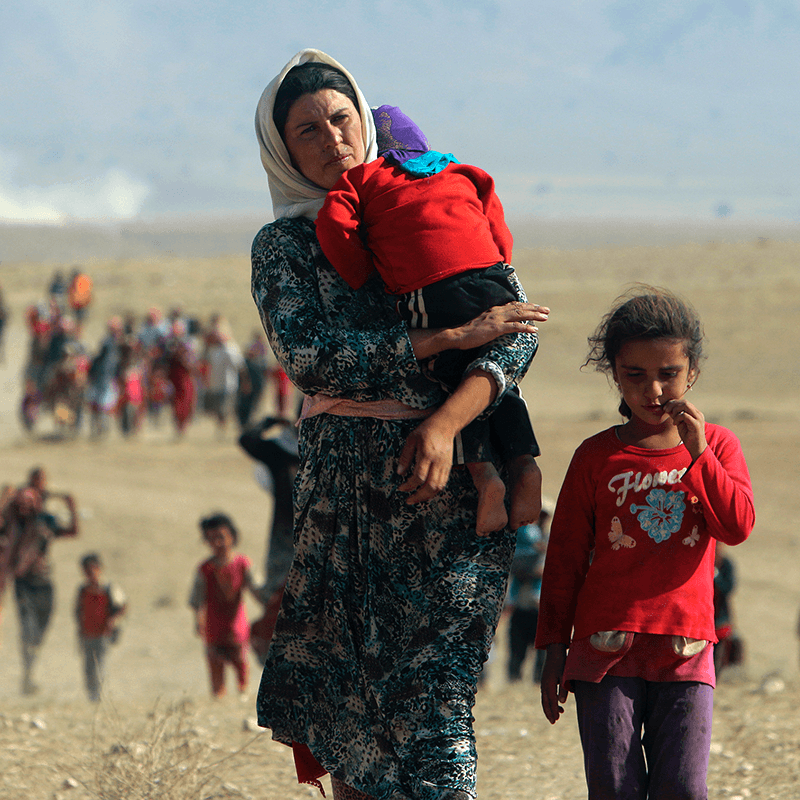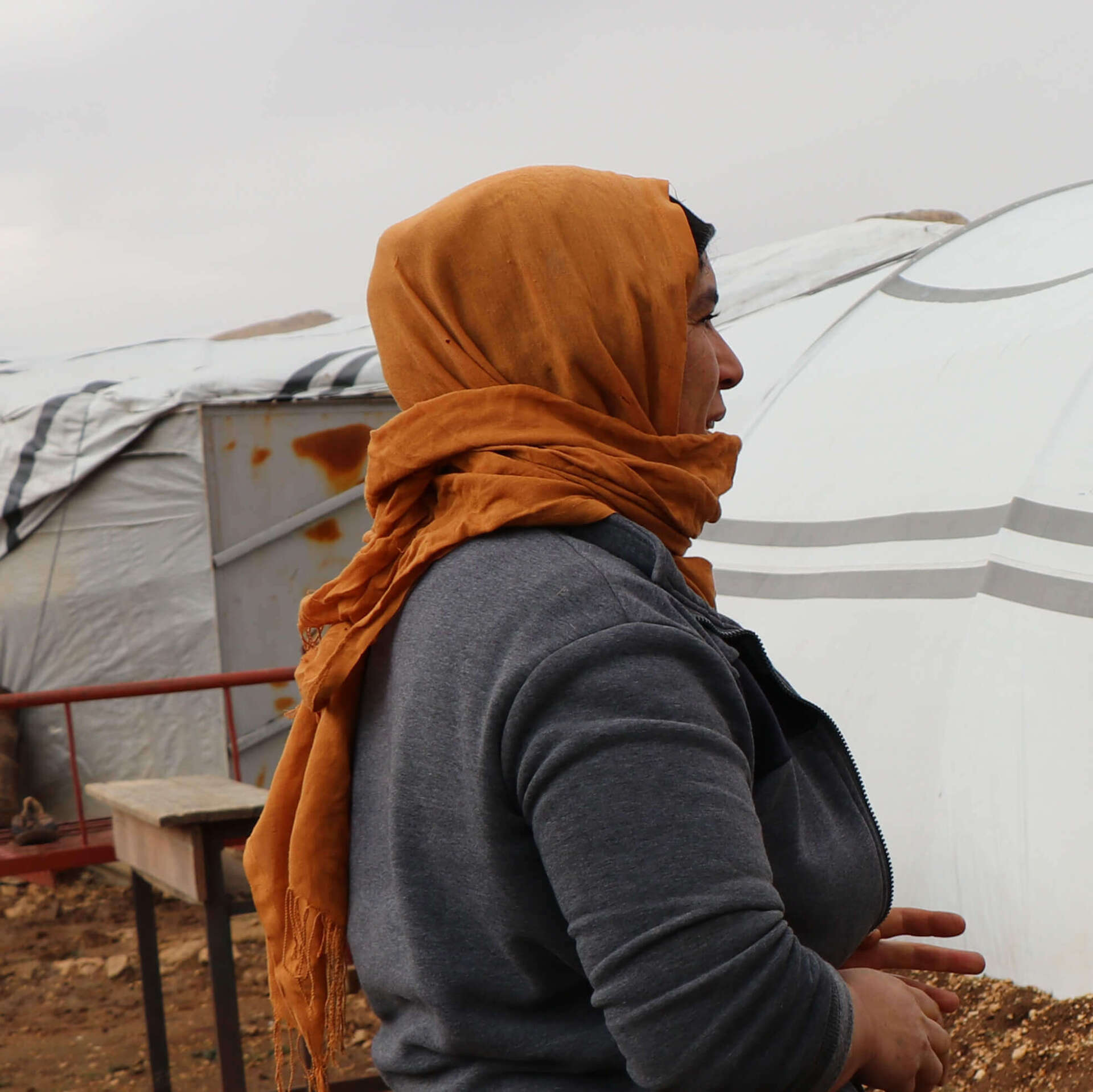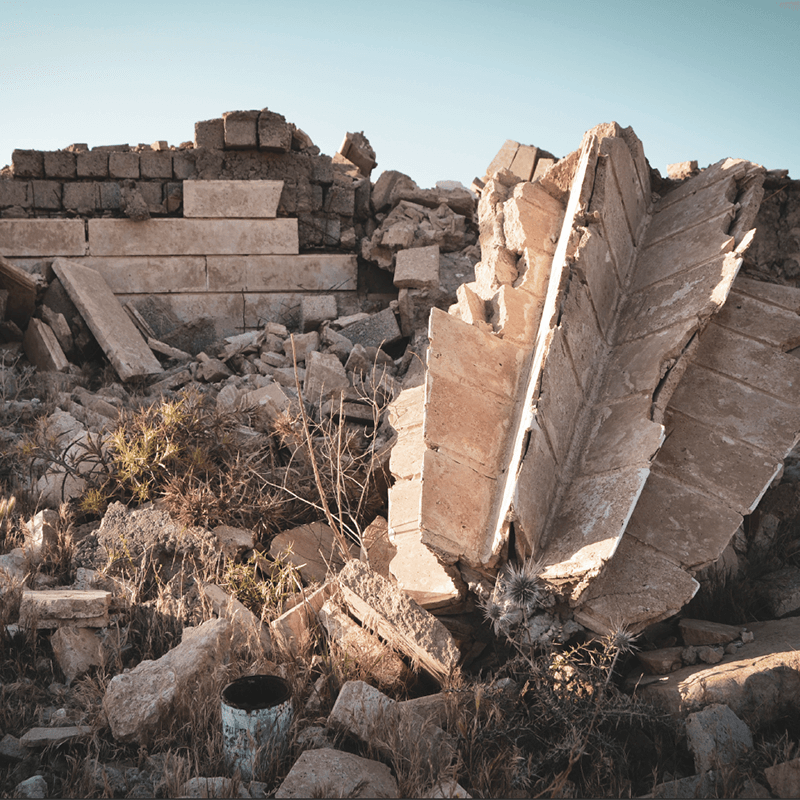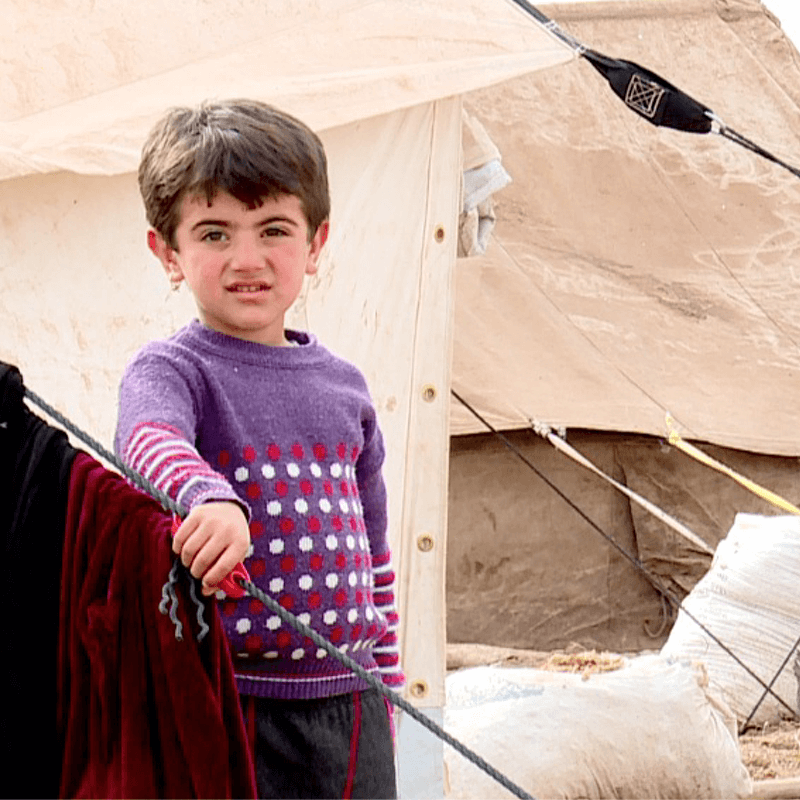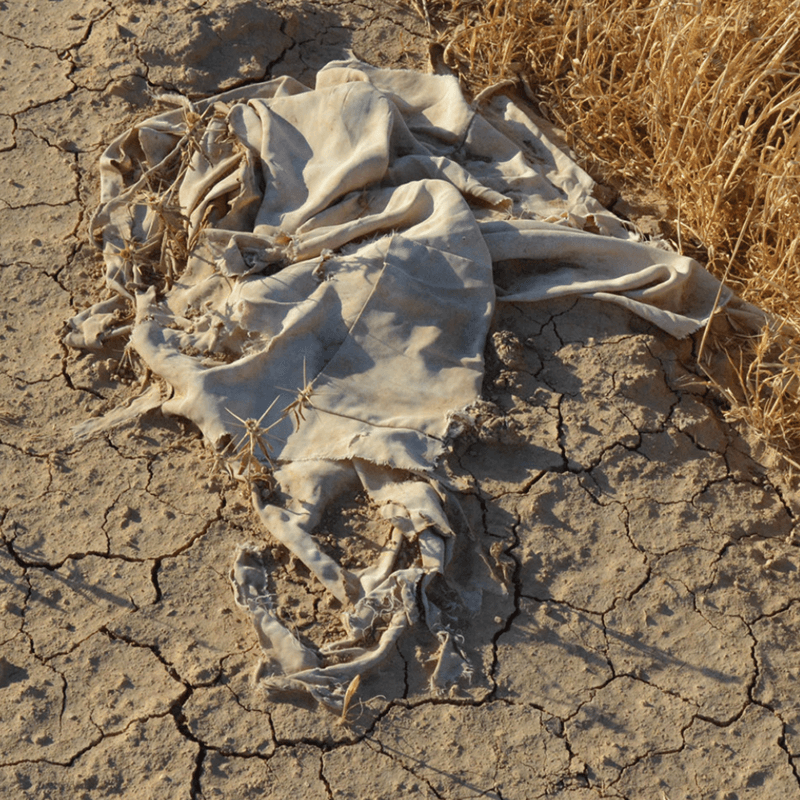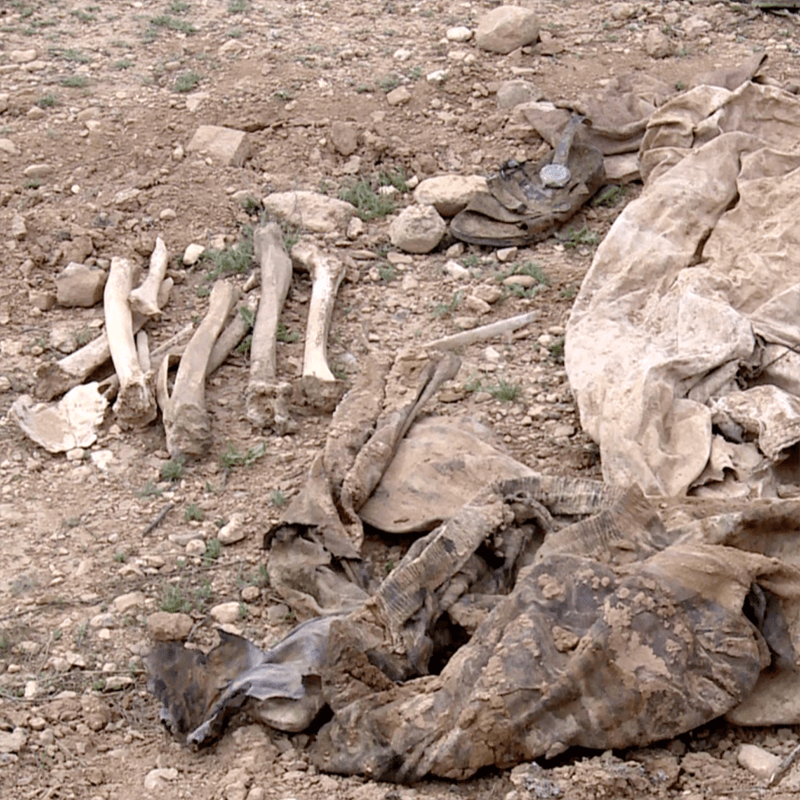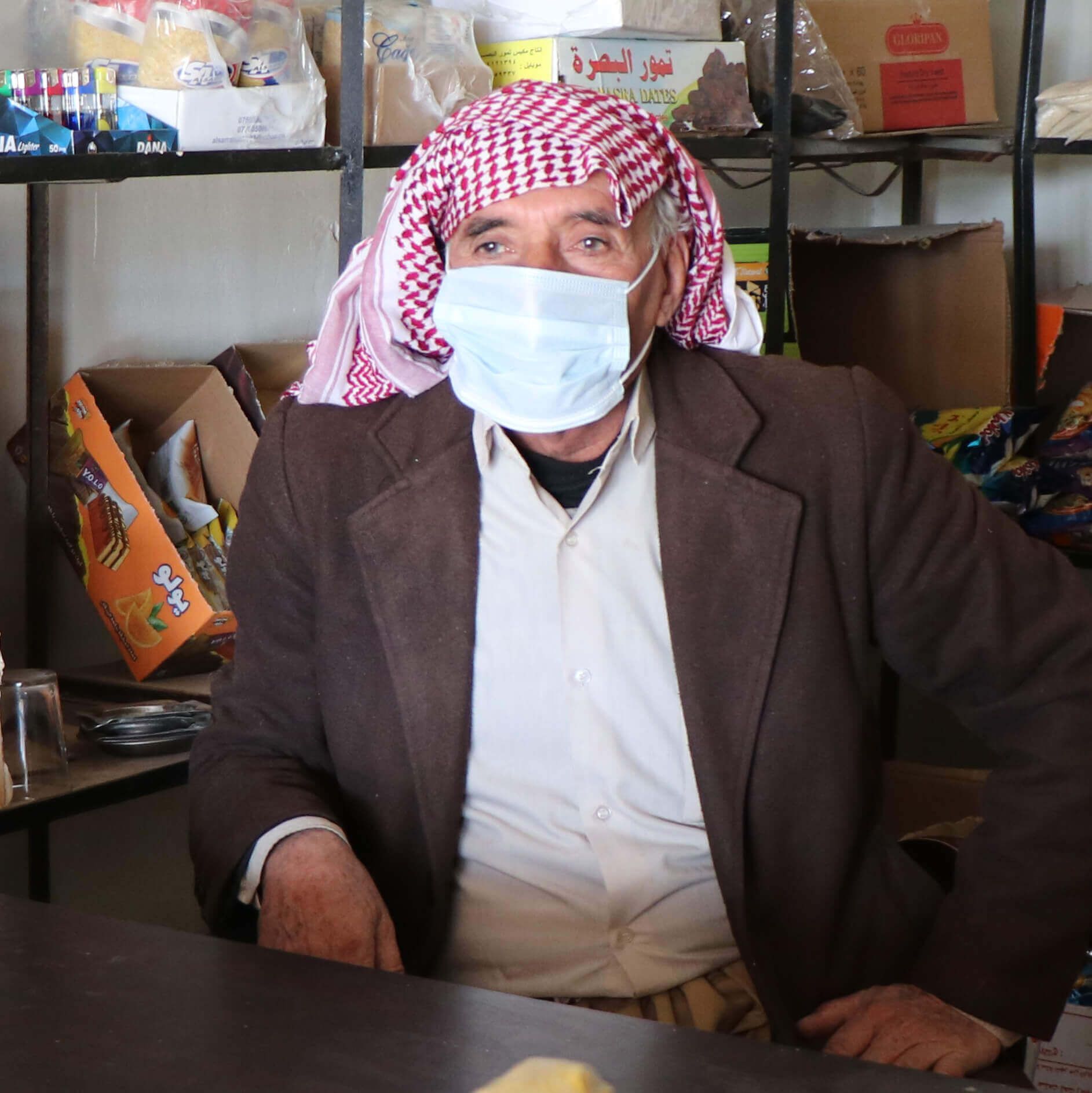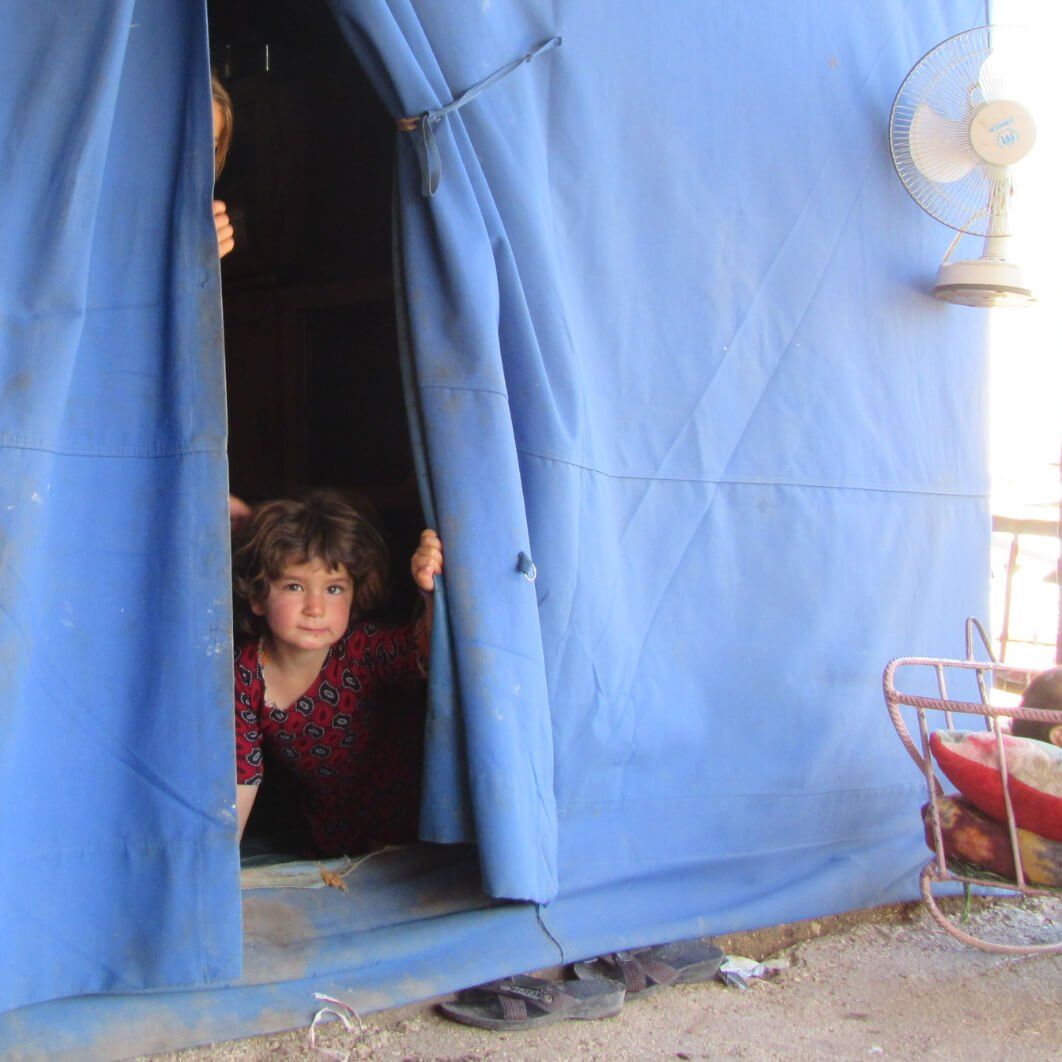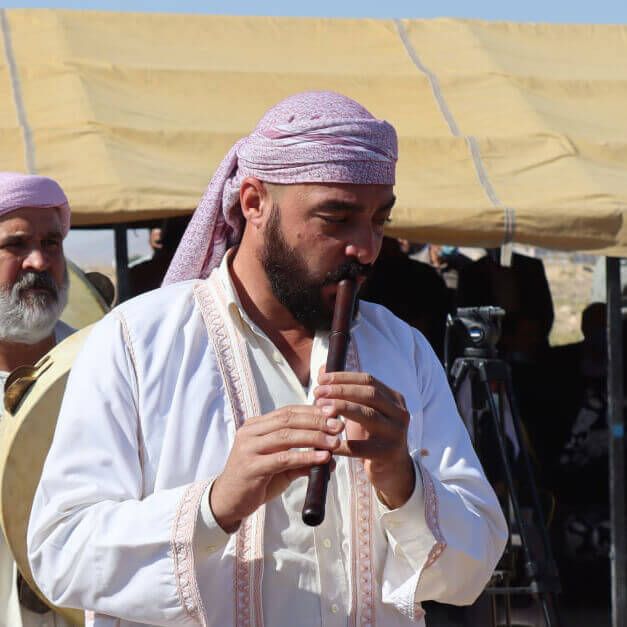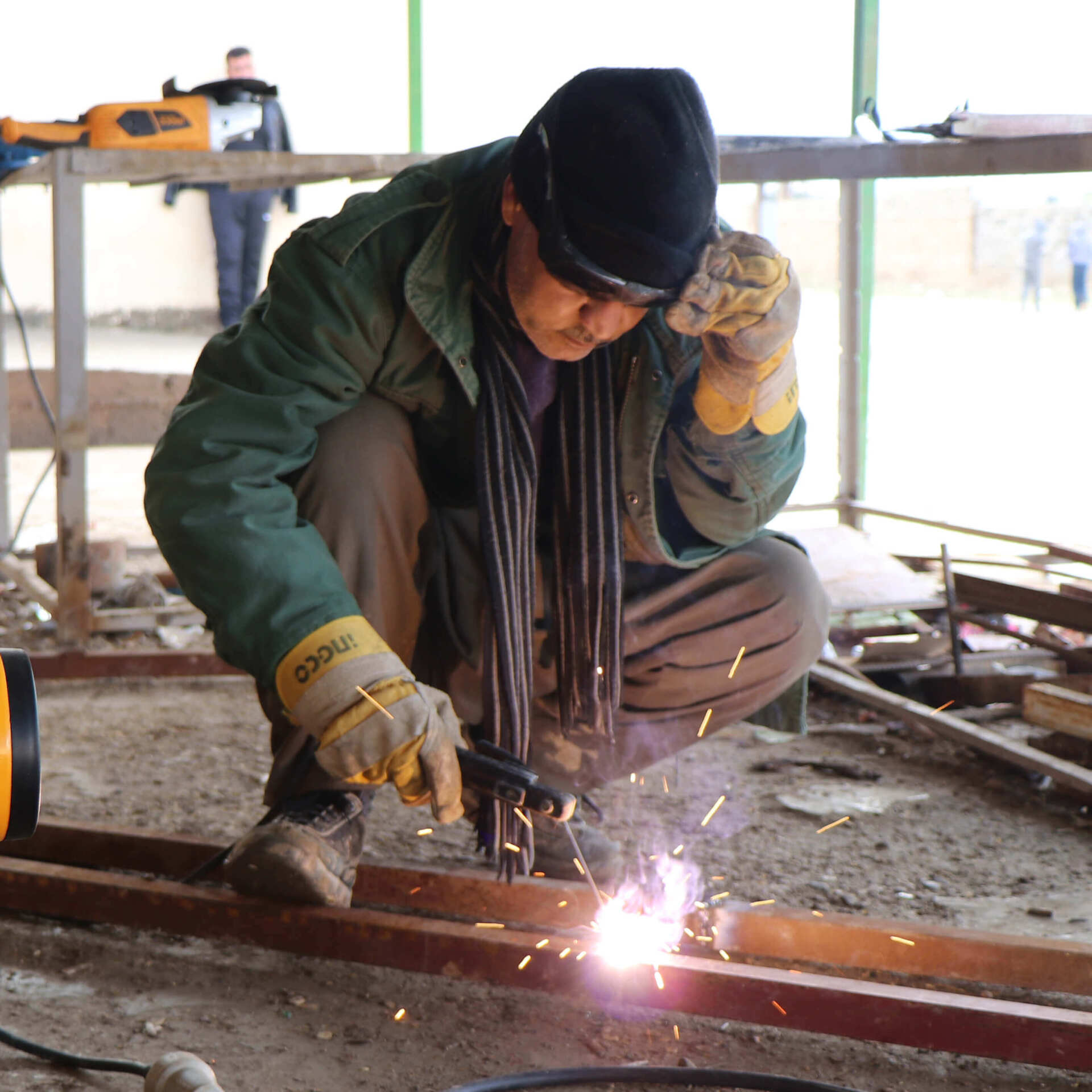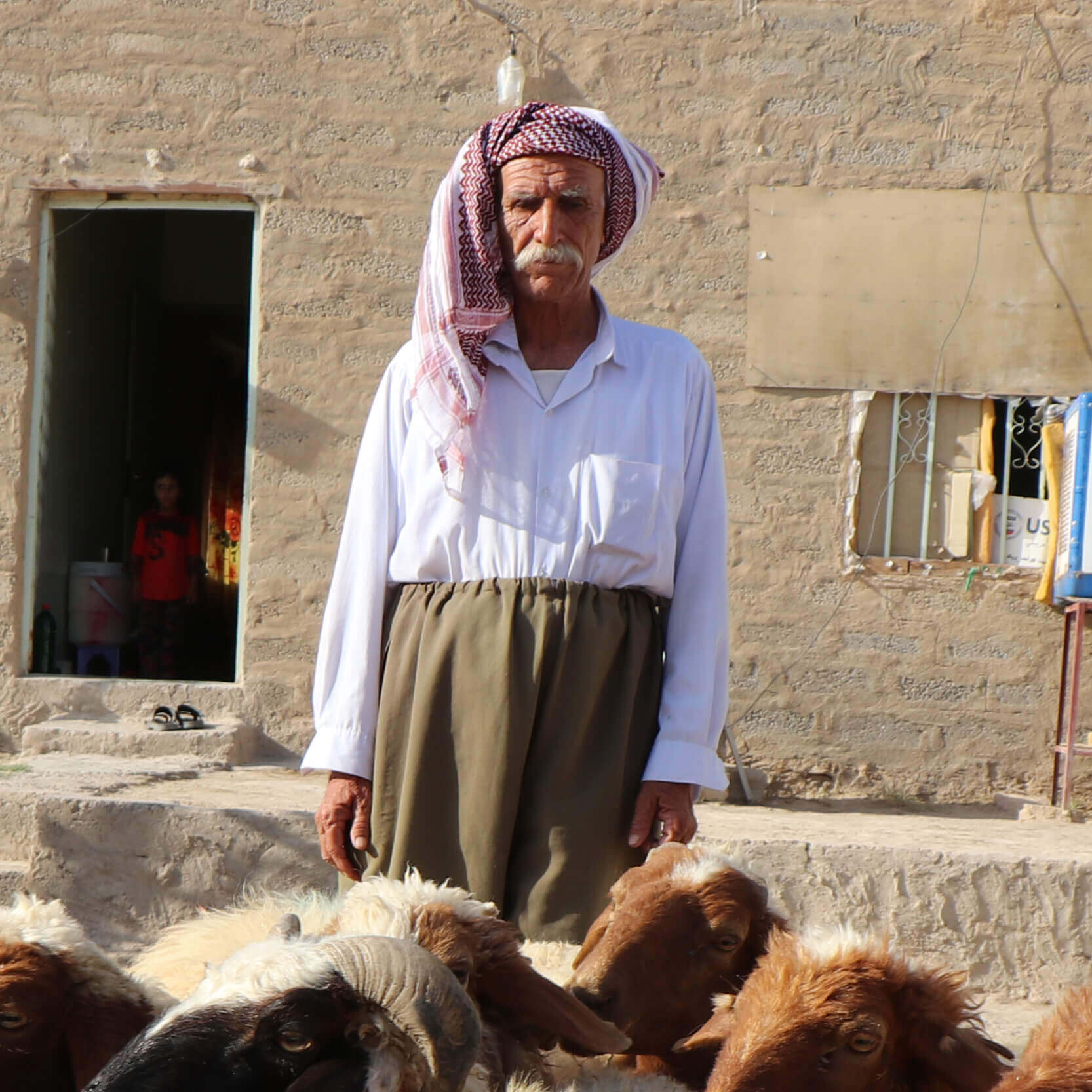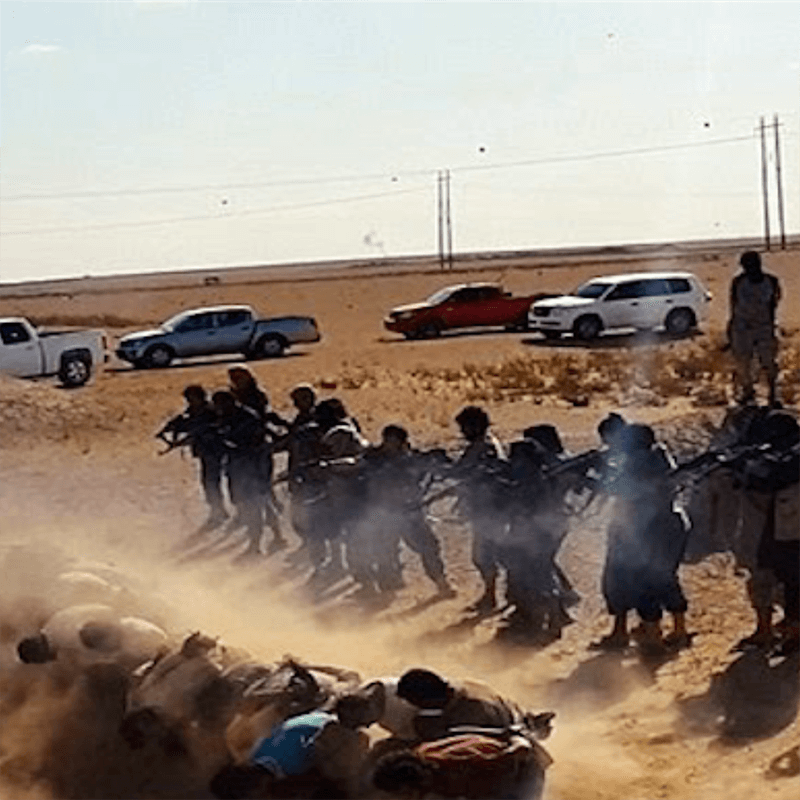Publications
Working closely with our partners, Yazda is committed to publishing community-led, high quality, and time-critical research on the Yazidi Genocide. Our repository of policy briefs, reports, and papers call attention to the humanitarian crises facing the Yazidi people, as well as the challenges to justice and accountability.
We look forward to receiving your inquiries here.
2024
Under Constant Threat
Hate Speech Against the Yazidi Community in Iraq and the Kurdistan Region of Iraq
December 2024
On August 3, 2024, during a commemoration of the Yazidi genocide, a remark during a speech by a Yazidi Peshmerga Commander, sparked widespread outrage after being perceived as offensive to Islam. Despite the commander’s later clarification that his remarks targeted extremist ideologies, the backlash led to a surge of hate speech against Yazidis, primarily on social media. The wave of hate speech that followed caused widespread panic among Yazidis, leading thousands to flee Internally Displaced Persons (IDPs) camps in the Kurdistan Region of Iraq (KRI) to find refuge in their areas of origin.
This new report sheds light on the waves of hate speech targeting Yazidi community and gives recommendations to authorities for immediate and future actions.
August 2024
To commemorate the tenth anniversary of the genocide committed by the Islamic State of Iraq and Syria (ISIL) against minorities including the Yazidi, Christian, Shabak, Turkmen and other communities in Iraq, Yazda together with the Coalition for Just Reparations (C4JR), SEED Foundation, and Jiyan Foundation, is proud to announce our latest collaborative report.
July 2024
Yazda, together with Free Yezidi Foundation and Sinjar Academy has published a Policy Paper that dives deep into the ongoing challenges faced by the Yazidi community. This isn’t just a document but a manifesto for action!
The policy paper issues a raft of recommendations varying from negotiation of a new security agreement, leadership, management of security forces in Sinjar and surrounding villages - to demanding for justice through the establishment of an international or hybrid tribunal to build upon the evidence collected by UNITAD and Civil society organizations.
Read the report and join this crucial mission to ensure a brighter tomorrow, not just for the Yazidis, but for all those impacted by the shadows of ISIL’s atrocities
There is no future in Sinjar without safety and agency
Part 2:
Frozen political will and a disempowered public administration threaten the future of Yazidis and minorities in Sinjar
July 2024
Published by the
Wilson Center and co-authored by Yazda and the
Zovighian Public Office, this second paper in a two-part series recommends immediate solutions to enable security, political representation, and effective governance in Sinjar for the Yazidis and historic communities. The report was launched at the Wilson Center with U.S. State Department and Yazidi NGO leaders.
July 2024
Over the past decade, NGOs, survivors and researchers have witnessed unethical and harmful behaviors by media practitioners, including stigmatizing survivors, putting them at risk of further violence, and sharing identifiable information without their informed consent. To encourage ethical reporting, Yazda and Taboo LCC developed a short guide for the media, with practical advice and requests on how to ethically engage with survivors and report on the genocide, with a list of accessible resources.
September 2023
Since the beginning of the genocide in Sinjar in August 2014, members of the Yazidi community, especially survivors of ISIL captivity have been interviewed countless times by multiple actors and for a variety of reasons, including to document their testimonies, implement projects, conduct research, write media and academic articles, or produce documentaries.
July 2023
Nine years after the so-called Islamic State of Iraq and the Levant (ISIL) targeted the Yazidi community and other groups in Iraq, Yazda releases a report to focus on child-centered documentation, investigation, prosecution, and broader transitional justice processes. To support the preparation of this report, Justice Rapid Response (JRR) deployed to Yazda a JRR rostered expert on children's rights who provided technical support.
August 2023
Over 50 separate locales (towns, villages, groups of houses, small valleys) in Sinjar were affected by the events of August 2014. Although there is a significant amount of publicly available information on ISIL crimes against the Yazidi community, it has either focused on ISIL crimes broadly without examining particular Yazidi villages, or on a limited number of villages, such as Kocho.
This report seeks to address this gap by examining ISIL’s attacks on Ger Zarik, Siba Sheikh-Kheder and Tel Azer. These locations were selected as they were the first majority-Yazidi villages in Sinjar targeted by ISIL.
September 2022
On August 3, 2014, the so-called Islamic State attacked Sinjar, launching a campaign of genocide against Yazidis and other minorities in northern Iraq. In the aftermath of the attack, the Yazidi community has suffered devastating consequences. It is estimated that 6,417 Yazidis were abducted, women and girls were sold into sexual slavery, and young Yazidi boys were captured and forced into re-education camps and ideological schools. Searching for and identifying Yazidis who have gone missing since 2014 is one of the biggest challenges facing the Yazidi community. It is estimated that 2,763 Yazidis remain missing.
September 2022
Co-authored by Yazda and
The Zovighian Partnership, this first paper in a two-part series presents and recommends immediate solutions to strengthening security in Sinjar. Published by the
Wilson Center, the series aims to equip national and international stakeholders with community-led and actionable recommendations to enable political support for all minority communities in Sinjar.
August 2022
In a survivor-led report titled, “Why calls for transitional justice for Yazidi genocide survivors must not go unheard,” published in Arab News,Yazidi survivors describe what constitutes personal and collective justice after escaping Da’esh captivity and returning to their families in makeshift camps in Sinjar.
August 2022
The Coalition for Just Reparations (C4JR) presents this paper with the aim of bringing fresh momentum to the pursuit of criminal accountability in Iraq for international crimes committed by the so-called Islamic State in Syria and the Levant (ISIL) also known as
Da’esh, eight years after the genocide. The goal of establishing a path to justice for these crimes, a high priority for survivors and one that Iraq has committed itself to, has so far proved challenging to deliver.
January 2022
Yazda, in partnership with IOM and funded by USAID, has been working with survivors of genocide living in northern Iraq and the Sinjar area through the provision of protection services, capacity building for a Yazidi Survivors Network, and awareness and advocacy through the “Nobody’s Listening” virtual reality experience. One of the main focuses of this project has been the protection programming which, to date, has supported over 200 survivors of genocide, mass atrocities, and human rights violations in Iraq, currently living in the Sinuni and Sinjar sub-districts.
January 2022
This study is a part of the broader implementation of supporting stability and sustainable returns in Ninewa, by investigating the current Yazidi diaspora of Australia engagement in advocacy and support in Iraq. Ultimately these findings will be used to make the most of the Yazidi diaspora skills, resources and sentiment to contribute to a sustainable and peaceful Iraq.
August 2021
Genocide against the Yazidi people in Iraq began on the 3rd of August, 2014, with organized military and community extermination efforts by Da’esh, resulting in acts of war and genocide including, mass crimes, massacres, systematic abductions, enslavement of women and children, forced conversion, and forced displacement of thousands of our people.
Interim Relief Program for CRSV in Iraq: Survivors’ Grant Scheme in Practice and Recommendations for its Improvement
March 2021
This report by Yazda presents key policy recommendations to improve the Yazidi Female Survivors Law, which has yet to be fully implemented. These are co-defined with Yazidi survivors using data collected information from 100 interviews to ensure the grant scheme is equitable, inclusive, and urgently disbursed.
September 2020
This strategic documentation presents the transcripts of the Sixth Annual Commemoration of the Yazidi Genocide in 2020 under the patronage of Iraqi President Dr. Barham Salih. It documents the key challenges facing the Yazidi people and policy recommendations and pledges made by the community and key stakeholders.
September 2020
This Yazda documentation presents transcripts of key speeches from the first Yazidi Community Leadership roundtable hosted since the onset of the genocide. Speakers spoke to the urgency of a safe return to Sinjar in the midst of political turbulence, as well as the need for humanitarian services and agile accountability.
August 2019
This report by Yazda details the decimated Yazidi religio-cultural sites and urges the international community to hold perpetrators accountable and safeguard Yazidi cultural assets. This intentional destruction has been an under-discussed strategy of the Yazidi genocide, but provides further proof of its occurrence.
2019
This policy paper by Yazda advocates that Iraq, the KRI, and the international community adopt 10 policy recommendations presented at the Fifth Annual Commemoration of the Yazidi Genocide. Speakers, dignitaries, and survivors presented action items to enable stability, humanitarian support, and justice for Yazidis.
2018
In this report, Yazda documents and maps mass graves in Sinjar and the Nineveh Plains to demonstrate the intentional acts of genocide committed by Da’esh. This report is part of the Yazda Genocide Documentation Project, which records key evidence to empower legal advocacy efforts for accountability and justice.
2017
Published three years after the genocide began, this report by Yazda provides a comprehensive review of the status of Yazidis in Iraq, KRI, the rest of the Middle East, and around the world. It also details the needs of Yazidis in captivity, as well as ongoing discrimination in the midst of geopolitical instability.
December 2016
Yazda asserts the unique ethno-religious identity of Yazidis and denies claims that impose another identity onto them. Due to this distinctive culture, history, and identity, specific persecution against Yazidis must be fully recognized, and they are therefore entitled to legal protection like other minorities in Iraq.
August 2016
This report by Yazda analyzes the ongoing Yazidi genocide and the motivations for Yazidis fleeing Iraq. It covers the humanitarian situation of displaced Yazidis in refugee camps in Greece, Turkey, and Syria, as well as urges the international community to urgently provide safe asylum mechanisms and legal protections.
January 2016
This report prepared by the Yazda Documentation Project corroborates the physical evidence of genocide with testimonies from Yazidi survivors. It identifies critical risks to the forensic integrity of mass grave sites, and calls for the exhumation of all human remains so that accountability may be swiftly achieved.
January 2016
This report by Yazda on humanitarian aid for Yazidi IDPs investigates how the distribution of aid is inaccessible to many displaced persons. It advocates a shift in focus from only disbursing immediate humanitarian aid to enabling the sustainable rebuilding of Sinjar so that IDPs may safely return to their homeland.
October 2015
In this report, Yazda underscores the ongoing genocide against Yazidis and humanitarian challenges facing Yazidi refugees in Turkey and Syria. It notes that the UNHCR interviews are not scheduled until 2022 and urges the international community to allocate a quota for Yazidi refugees to resettle in a safe country.
September 2015
This report by Yazda and the Free Yezidi Foundation requests that the Prosecutor of the International Criminal Court formally commences a preliminary examination into the Yazidi Genocide. It presents a legal case given the number of Da’esh foreign fighters who are nationals of state parties to the Rome Statute.
